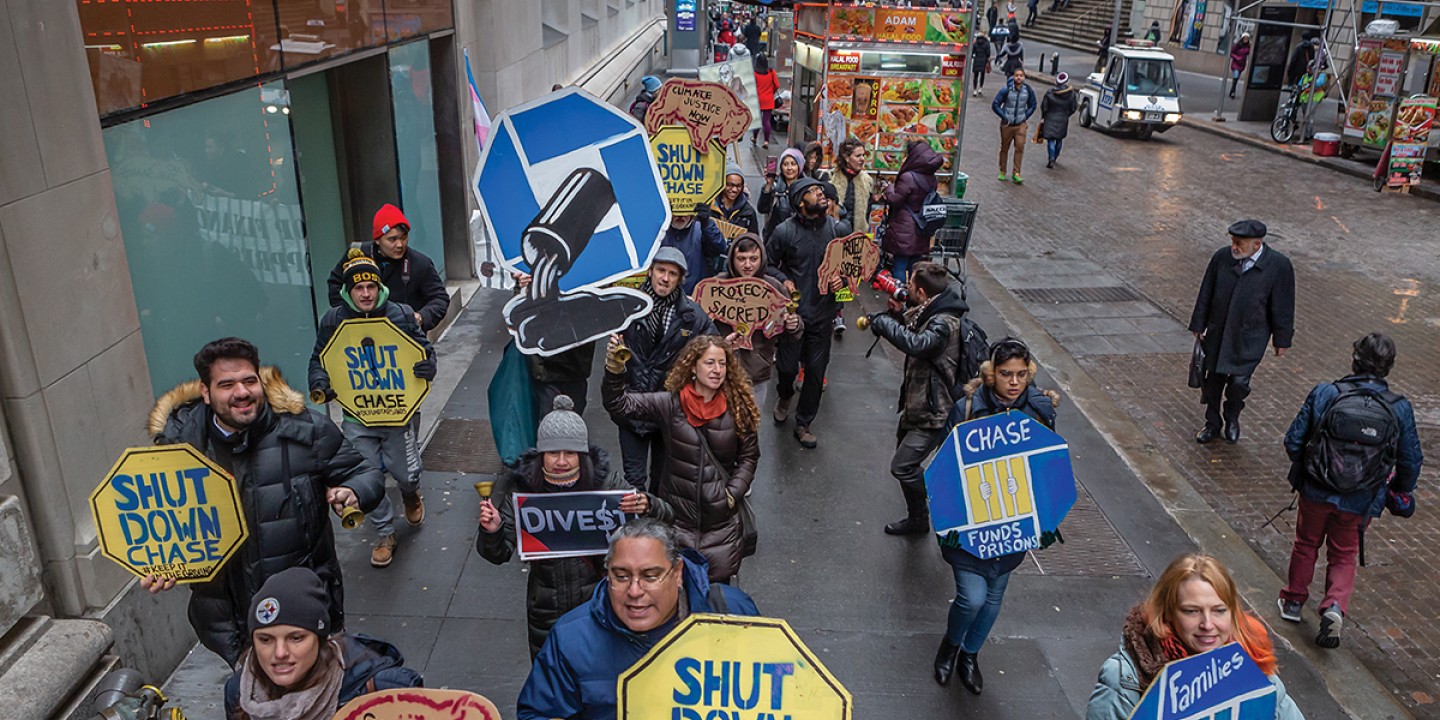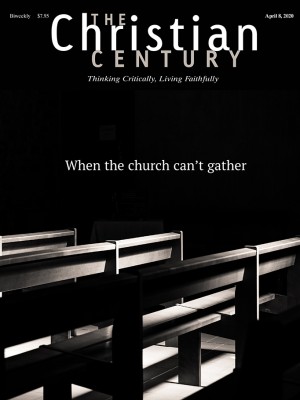Attacking climate change one bank at a time—starting with Chase
It’s time to stop the biggest lenders to the fossil fuel industry.

We are at a strange and awful moment in our planet’s history. We watch as vast fires consume whole swaths of the Australian continent, killing animals by the billion. We watch as temperatures keep climbing: January was the warmest January ever measured, and February saw the highest temperature ever recorded on the Antarctic continent, with the mercury at one research station soaring to 65 degrees. We watch as people driven from their homes by drought pile up against the fences erected at national borders.
We don’t just watch, of course—many also act.
People have bought electric cars and learned to bike; people have insulated their houses and put solar panels on their roofs; people have learned to eat lower on the food chain. It all matters—and yet even as we do it we sense we’re past the point where we can solve this crisis one Tesla at a time.
Read our latest issue or browse back issues.
So people engage in politics, reasoning that if one group of leaders hasn’t addressed the crisis, another might. This too is crucial work, especially in even-numbered years, especially in this even-numbered year when so much is at stake. But we also sense that no matter who wins in November, our rusted and dysfunctional federal government will have a hard time making change on the scale that’s required—and even if it does, Washington is just one capital in a world that must shift at lightning speed.
What I’m saying is: I think many people, scared and heartsick, want more that they can do.
So how nice it would be if there was another big step we could also take, one that might move our global system toward rapid change. And how nice it would be if Jesus had provided some direction as to where to look.
I’ve always liked the accounts of Jesus and the money changers in the temple, mostly because I’m prone to anger. I have a firm intellectual—and practical—commitment to nonviolence, and I think turning the other cheek may be the most important lesson the gospel teaches. But sometimes I get worked up into a good self-righteous huff, and I want to strike. So the image of Jesus walking up and turning the tables over, spilling cash and receipts onto the floor, scattering the startled money changers and the crowds—I’m glad we get a little glimpse of that Jesus, too.
In January, I joined a small group of other environmentalists—including the veteran leader and Church of God in Christ minister Lennox Yearwood—in the lobby of the Chase Bank nearest to Capitol Hill. While Jane Fonda and other celebrities rallied outside, we sat down in the lobby and refused to leave. We didn’t overturn any desks—indeed, we had no beef at all with the perfectly nice bank employees whose day we disrupted. But it felt right.
We were at Chase because of all the banks on the planet, it’s the one that’s lent the most money to the fossil fuel industry. In just the years since the Paris climate accords supposedly united the planet in the task of taking on climate change, the bank has lent $196 billion to the coal, oil, and gas industries. If you look at the projects designed to dramatically expand the fossil fuel industry—the new pipelines, the tar sands mining, the deep-sea drilling—Chase is considerably worse even than the other big banks like Citi and Wells Fargo and Bank of America. In the face of activist pressure, Chase made a few small changes in mid-February, agreeing to limit lending to coal miners and to those planning to drill for oil in the Arctic—but after those announcements, Chase was still the biggest ATM the fossil fuel industry has. And hence we need to take it on.
Here’s the point: the political lever is not the only one we can pull. Decisions don’t get made just in Washington, D.C. Financial power is real, too—indeed, if you were looking for powers and principalities in our world, you’d probably look to Wall Street. If it changed its ways, the results would be both swift and global: if Chase decided tomorrow to stop lending money for expansionary fossil fuel projects, the stock markets of every continent would immediately reflect that new piece of data. Just like that, life would get far harder for gas and oil barons, and easier for the people trying to set up solar panels and windmills.
That’s why even as we work on elections, many of us are also hard at work on a project we’re calling Stop the Money Pipeline.
After eight years of efforts, fossil fuel divestment has grown to perhaps the largest anticorporate campaign in history. Endowments and portfolios worth a total of $12 trillion have announced that they’ll no longer invest in the fossil fuel companies driving the climate crisis. They include not just great educational institutions (the University of California system, half the universities in the UK) and great cities (New York’s and London’s pension funds) but also many faith-based institutions. Georgetown University divested in January, a signal Catholic commitment to the fight; the General Assembly of the Presbyterian Church (U.S.A.) votes soon.
This massive effort has paid off. There are dozens of studies, but probably more persuasive was the testimony of Jim Cramer, America’s most manic TV stock-picker, when he declared in January that it was no use for investors to try to make money in oil and gas stocks because “we’re starting to see divestment all over the world.” As a result, he said, oil and gas stocks were “in the death knell phase.”
But we need to speed that phase up, because scientists have told us that absent massive changes this decade, our chances of meeting the targets set in Paris are nil. Hence, what you might call divestment, phase two. Stop the Money Pipeline takes aim at the banks, investment houses, and insurance companies that provide the cash that keeps the fossil fuel industry expanding. In return for short-term profits they are insuring that we keep building infrastructure that will last—not one decade, but four or five. With the flat and amoral logic of the money changer, they reckon temple protection is not their job, even if the temple in question this time is the planet we all share.
That’s why people are starting to challenge them, and with success. Campaigns against BlackRock, earth’s biggest asset manager, resulted in a new corporate policy on climate change this year that, if conscientiously followed, might make a real difference. Protests against Liberty Mutual got the insurer to at least start backing away from coal companies, a small but telling step. Now it’s Chase that’s in the spotlight: on April 23, one day after the 50th anniversary of Earth Day, there will be demonstrations inside and outside of hundreds, maybe thousands, of Chase Bank branches. In some cases, as happened in D.C., people will decide to go to jail. Elsewhere there will be informational pickets, brass bands marching through lobbies, or teach-ins.
But—thanks to the wonderful religious organizers at GreenFaith and elsewhere—at dozens and dozens of branches there will be pray-ins, too. Congregations can go to the Stop the Money Pipeline website, take responsibility for a nearby Chase branch, and then figure out how to send the word—lovingly, but firmly—that it’s not OK to try to profit off the destruction of creation. For banks, this should be a relatively easy switch. Unlike oil companies, which seem set on defending their business model to the end, even a bank like Chase lends only about 7 percent of its money to oil and gas. They could lend it to someone else instead—maybe even to someone doing something helpful.
I’m just theologically aware enough to know that the old clichéd imagery of hell—the unquenchable flames and so forth—aren’t necessarily literal. But I’m scientifically aware enough to know that what happened in Australia—and before that in California and Greece and the Congo—resemble that old picture far too closely. There’s nothing metaphorical about watching your house burn up, nothing allegorical about the sounds of animals screaming in the embers of a vast blaze. I know that God promised Noah not to send another flood, but as the rains from Hurricane Harvey, or Storm Dennis in Britain, or the epic floods in Mississippi make clear, we’re completely capable of flooding ourselves.
And I know that when Jesus overturned the tables of the money changers, he was sending a message about a particular situation at a particular time. But I also know that messages carry across time, echoing in new and useful ways. We have yet another chance to follow in those footsteps, and we should take it.
A version of this article appears in the print edition under the title “Making change at Chase.”






